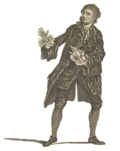- To be, or not to be
-
For other uses, see To Be or Not to Be.
"To be, or not to be" is the opening phrase of a soliloquy from William Shakespeare's play Hamlet (written about 1600), Act III, Scene 1. It is the best-known quotation from the play and one of the most famous in world literature but there is disagreement on its meaning, as there is of the whole speech.
Contents
Text
This is the First Folio text (www.perseus.tufts.edu/hopper/image?img=1998.04.0773) with spelling updated and some word emendations from modern editions, but with original capitals and punctuation as useful clues to rhythm, emphasis and meaning.
“ To be, or not to be, that is the Question:
Whether 'tis Nobler in the mind to suffer
The Slings and Arrows of outrageous Fortune,
Or to take Arms against a Sea of troubles,
And by opposing end them: to die, to sleep
No more; and by a sleep, to say we end
The heart-ache, and the thousand Natural shocks
That Flesh is heir to? 'Tis a consummation
Devoutly to be wished. To die to sleep,
To sleep, perchance to Dream; Ay, there's the rub,
For in that sleep of death, what dreams may come,
When we have shuffled off this mortal coil,
Must give us pause. There's the respect
That makes Calamity of so long life:
For who would bear the Whips and Scorns of time,
The Oppressor's wrong, the proud man's Contumely,
The pangs of despised Love, the Law’s delay,
The insolence of Office, and the Spurns
That patient merit of the unworthy takes,
When he himself might his Quietus make
With a bare Bodkin? Who would these Fardels bear,
To grunt and sweat under a weary life,
But that the dread of something after death,
The undiscovered Country, from whose bourn
No Traveller returns, Puzzles the will,
And makes us rather bear those ills we have,
Than fly to others that we know not of.
Thus Conscience does make Cowards of us all,
And thus the Native hue of Resolution
Is sicklied o'er, with the pale cast of Thought,
And enterprises of great pitch and moment,
With this regard their Currents turn awry,
And lose the name of Action. Soft you now,
The fair Ophelia? Nymph, in thy Orisons
Be all my sins remembered.[1]” As Hamlet speaks, Ophelia is present and both are spied on by Polonius and Claudius but until he sees Ophelia at the end Hamlet thinks himself alone.
The principal areas of disagreement about this speech are whether it is about suicide or merely the condition of being dead, whether - if it is about suicide - Hamlet is actually suicidal or merely talking about it, what the conclusion 'Conscience does make cowards of us all' means, and how this conclusion follows from the preceding parts of the speech (to many commentators the moral meaning of 'Conscience' implausible because it makes the line a nonsequitur). Despite all this fundamental uncertainty it is regarded as Hamlet's most important speech.
 The first quarto's version of the speech
The first quarto's version of the speechIn the First Quarto, Hamlet's "To be, or not to be" speech appears as follows:
To be, or not to be, aye there's the point,
To Die, to sleepe, is that all? Aye all:
No, to sleepe, to dreame, I mary there it goes,
For in that dreame of death, when wee awake,
And borne before an euerlasting Iudge,
From whence no passenger euer retur'nd,
The vndiscouered country, at whose sight
The happy smile, and the accursed damn'd.
But for this, the ioyfull hope of this,
Whol'd beare the scornes and flattery of the world,
Scorned by the right rich, the rich curssed of the poore?
The widow being oppressed, the orphan wrong'd,
The taste of hunger, or a tirants raigne,
And thousand more calamities besides,
To grunt and sweate vnder this weary life,
When that he may his full Quietus make,
With a bare bodkin, who would this indure,
But for a hope something after death?
Which pusles the braine, and doth confound the sence,
Which makes vs rather beare those euilles we haue,
Than flie to others that we know not of.
I that, O this conscience makes cowardes of vs all,
Lady in thy orizons, be all my sins remembred.[2]Notes
- ^ "The Tragedy of Hamlet, Prince of Denmark". First Folio 1623
- ^ Evans, G. Blakemore, et al; Published by Houghton Mifflin Harcourt, 1997; ISBN 0-395-85822-4, 9780395858226.
References
- Hamlet, Prince of Denmark. Philip Edwards, ed., updated edition 2003. (New Cambridge Shakespeare)
- Hamlet. Harold Jenkins, ed., 1982. (The Arden Shakespeare)
- Lewis, C.S., Studies in Words. Cambridge UP, 1960 (reprinted 2002).
- Schopenhauer, Arthur, The World as Will and Representation, Volume I. E.F.J. Payne, tr. Falcon Wing's Press, 1958. Reprinted by Dover, 1969.
- "Something Rotten". Jasper Forde 2004
- "The Tragedy of Hamlet, Prince of Denmark". Washington Square Press, ed., 1992. (Folger Shakespeare Library)
External links
- Hamlet's To Be Or Not To Be soliloquy translated into modern English
- The Fishko Files: The Many Faces of Hamlet from WNYC's Sara Fishko, a radio piece and accompanying blog post about the many interpretations of the soliloquy.
William Shakespeare's Hamlet Characters 
Soliloquies - "To be, or not to be"
- "What a piece of work is a man"
- "Speak the speech"
Sources & Criticism - Legend of Hamlet
- The Spanish Tragedy
- Ur-Hamlet
- Critical approaches
- Bibliographies
Influence Performances Adaptations Hamlet on screen Categories:- Hamlet
- Shakespearean phrases
- Monologues
- Snowclones
Wikimedia Foundation. 2010.
